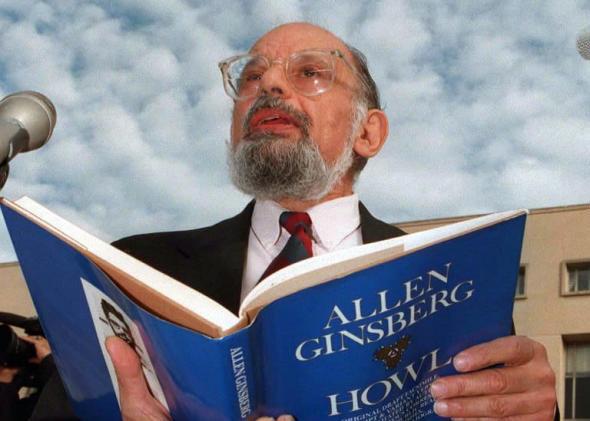By most accounts, David Olio was an excellent high school English teacher, beloved by many of his students and their parents. But in February, the veteran teacher made a fatal error: When a student asked to share the Allen Ginsberg poem “Please Master” with his AP English class, Olio obliged, playing a video of Ginsberg reading the poem aloud. Several students in the class complained to their parents and the school administration. In short order, Olio was suspended, then pushed by the administration to resign.
Olio’s decision to share Ginsberg’s poem was, undoubtedly, rather questionable. “Please Master” is discomfiting and profane, an explicit account of a fantasized sexual encounter between Ginsberg and Neal Cassady, the inspiration for the Dean Moriarty character in Jack Kerouac’s On the Road. I don’t want to quote individual lines out of context, as the poem derives its power from the steadily intensifying rhythmic build toward an explosive climax. If you can, listen to the performance that Olio played his class:
This isn’t kid stuff. But these weren’t kids; they were 17- and 18-year-olds less than a year from college. And as graphic as “Please Master” is, it’s certainly not obscene or lacking in artistic merit. Ginsberg’s poem clearly alludes to Saint Teresa’s violent visitation by an angel:
He was not tall but short, and very beautiful. … In his hands I saw a great golden spear, and at the iron tip there appeared to be a point of fire. This he plunged into my heart several times so that it penetrated to my entrails. When he pulled it out I felt that he took them with it, and left me utterly consumed by the great love of God. The pain was so severe that it made me utter several moans. The sweetness caused by this intense pain is so extreme that one cannot possibly wish it to cease, nor is one’s soul content with anything but God.
Teresa’s reaction to the angel’s penetration is often interpreted as orgasmic and depicted as acute ecstasy. Ginsberg’s provocative reimagining of the scene foregrounds its sexual undertones and revels in its ambiguous intermingling of pain and pleasure. The poem’s transgressive vulgarity—its profane description of anal sex as a nearly divine act—is precisely what lends it its power. “Please Master” is not a dirty work—it is a dangerous one: Dangerous because it dares to find beauty in sodomy; dangerous because it juxtaposes tenderness with masochism; dangerous because it rapturously celebrates a vision of same-sex intimacy we are only supposed to whisper about.
Very well, you might say: It’s a wonderful poem, but did he have to share it with high schoolers? Personally, I very much doubt any of Olio’s students were deeply disturbed by the poem—especially in the age of the Internet. At most, a few were probably grossed out. Still, I appreciate the school’s concern that students weren’t sufficiently warned or permitted to leave the room. Olio’s naive snap decision to play the video reflects bad judgment on his part. He deserves a reprimand, and his temporary suspension doesn’t strike me as grossly excessive. But so long as Olio understands where he went wrong, I don’t understand why he must permanently resign. The guy sounds like he genuinely loves teaching English literature to high schoolers. It’s rare to find someone so dedicated to such a thankless task. It seems like a waste to end his career over one mistake.
“Please Master” probably looks about as obscene to us today as Ginsberg’s “Howl” did in 1956. “Howl” was only available to the general public after a federal judge ruled it wasn’t obscene. Luckily, we’re all a bit more enlightened today, and you’re one click away from reading “Please Master” at this very moment. Lawrence Ferlinghetti (the original publisher of “Howl”) has written that Olio was absolutely justified in sharing “Please Master” with his students. Even if he wasn’t, his mistake was an honest one. From poems and novels to paintings and films, a lot of great art is also sexually explicit. In his rush to share a fascinating poem, Olio forgot he was teaching high school seniors and not college first years. If every English teacher were that enthusiastic about his subject, America would be a much more literate, educated, interesting place.
